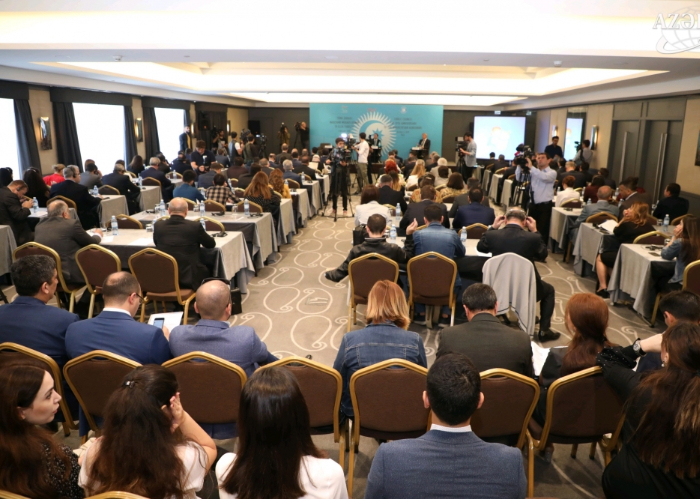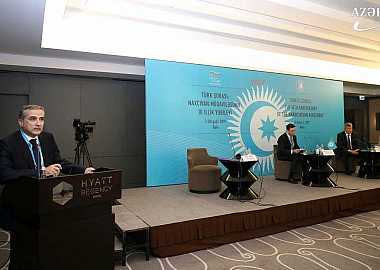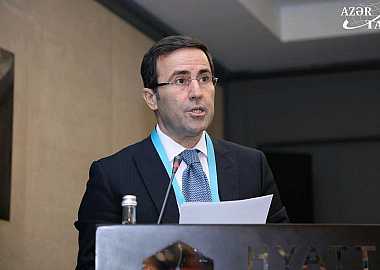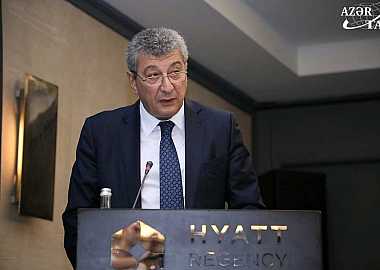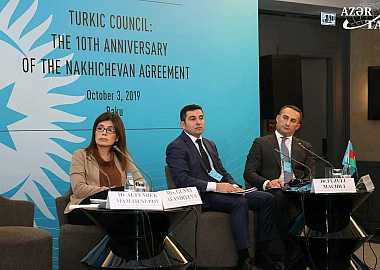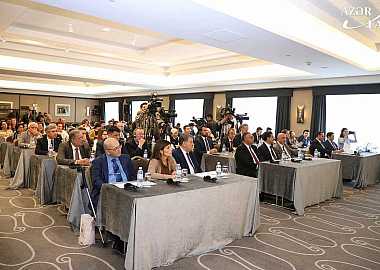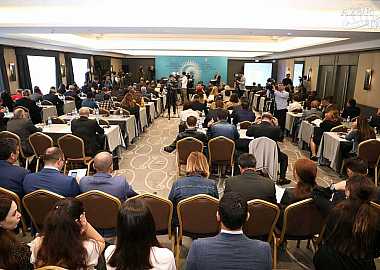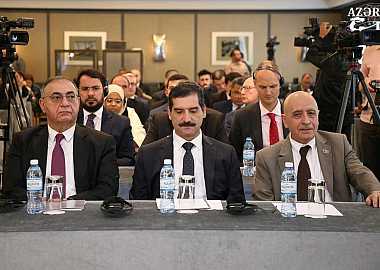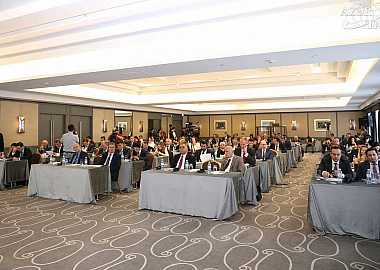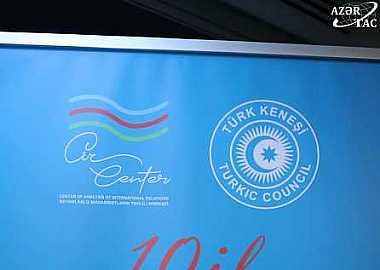Hosted by the Center for International Relations Analysis (AIR Center) of the Republic of Azerbaijan, the 5th Meeting of the Official Foreign Policy Research Centers of the Member States of the Turkic Council and a conference titled "Turkic Council: 10th Anniversary of the Nakhchivan Agreement" was convened on 3 October 2019 in Baku.
Ambassador Farid Shafiev, Chairman of the Board of AIR Center, Ambassador Ramiz Hasanov, Deputy Foreign Minister of the Republic of Azerbaijan, and Deputy Secretary General of the Turkic Council Gismat Gozalov delivered speeches at the opening of the Conference.
Mr. Farid Shafiyev emphasized that the purpose of this conferences is to celebrate the 10th anniversary of the Nakhchivan Agreement, as well as to discuss the issues related to the institutionalization of the Turkic Cooperation Organizations and unite the efforts of all member States in rendering all necessary support in their activities. He underlined that Azerbaijan as one of the founders of the Turkic Council plays an important role in preserving Turkic language, history, traditions and values. Referring to the Armenian-Azerbaijani Nagorno-Karabakh conflict, he noted that Armenians destroyed material and cultural heritage of Azerbaijan in its occupied territories. Considering that these monuments are common values of the Turkic peoples, the Member States of the Turkic Council must also react together to these vandalism acts.
Deputy Secretary General of the Turkic Council, Mr.Gismat Gozalov underlined the vital importance of the cooperation among the Official Foreign Policy Reserch Centers, believing that their fundamental research on international relations and other relevant issues during the current global changes directly contributes to the integration processes of the Member States. Deputy Secretary General underlined the special significance of Uzbekistan’s accession to the Turkic Council and opening of the European office of the Turkic Council in Hungary to develop relations with European Union countries and other international organizations. He also touched upon about the establishment of the Joint Chamber of Commerce and Industry (TCCI) of Turkic Speaking Countries and gave information on efforts undertaken by the Secretariat to set up a Turkic Joint Investment Fund (TJIF), as well as side events to be organized during the upcoming 7th Summit of the Turkic Council.
Deputy Foreign Minister Ramiz Hasanov emphasized that the Turkic Council is an important platform for expanding relations among the member states. He underlined that the Council plays an important role in the preservation of the common culture and heritage of the Turkic people and the revival of the historical Silk Road is one of the priorities of the economic cooperation among the Member States. The Deputy Minister expressed confidence that the Nakhchivan Agreement will continue to make a significant contribution to the strengthening of relations among the Turkic Speaking States.
Speaking at the first panel on "Turkic Council: Problems and Prospects of Institutionalization and Development of the Turkic Council", the President of the International Turkic Culture and Heritage Foundation Gunay Efendiyeva gave informations in detail about the activities of the Foundation and its work. She mentioned that the Foundation has recently developed various projects covering the Turkic world's culture, rich history, national and moral values.
Secretary General Mr. Altynbek Mamaiusupov referred to the Nakhchivan agreement as the historical momentum for Turkic-speaking countries and mentioned that the Turkic Council emerged as a key actor of regional cooperation based on shared values and principles that include voluntariness, consensus, solidarity and transparency. Mr. Mamaiusupov expressed his hope that Parliament of Uzbekistan would join TURKPA in near future.
During the same panel discussions, Project Director of the Turkic Council Mr. Jeyhun Shahverdiyev also delivered a speech and gave information on possible areas and required joint efforts for further institutionalization and integration of the Turkic Speaking States.
In the second panel on "Future Perspectives for Cooperation among the Member States".moderated by Dr. Ufuk Ulutas, Head of the Center for Strategic Research of the Ministry of Foreign Affairs of the Republic of Turkey (SAM), Mrs. Alua Zholdybalina, Head of Social and Political Studies Department of the Institute for Strategic Studies under the President of the Republic of Kazakhstan, Mr. Márton Ugrósdy, Director of the Institute for Foreign Affairs and Trade of the Republic of Hungary (IFAT), Dr. Sanjar Valiyev, Deputy director of the. Mr. Kybanychbek Toktorbaev, Chief Researcher of the National Institute for Strategic Studies of the Kyrgyz Republic (NISS) and Dr. Javid Veliyev, Head of Section of the Center of Analysis of International Relations shared their analyses and proposal for furthering the cooperation among the Member States.
After the Conference, the representatives of the Official Foreign Policy Research Centers of the Member States of the Turkic Council with the participation of Mr. Márton Ugrósdy, Director of IFAT of Hungary and Dr. Sanjar Valiyev, deputy director of ISRS of Uzbekistan discussed the possible cooperation issues among the official think tanks of the Member States.
Ambassador Farid Shafiev, Chairman of the Board of AIR Center, Ambassador Ramiz Hasanov, Deputy Foreign Minister of the Republic of Azerbaijan, and Deputy Secretary General of the Turkic Council Gismat Gozalov delivered speeches at the opening of the Conference.
Mr. Farid Shafiyev emphasized that the purpose of this conferences is to celebrate the 10th anniversary of the Nakhchivan Agreement, as well as to discuss the issues related to the institutionalization of the Turkic Cooperation Organizations and unite the efforts of all member States in rendering all necessary support in their activities. He underlined that Azerbaijan as one of the founders of the Turkic Council plays an important role in preserving Turkic language, history, traditions and values. Referring to the Armenian-Azerbaijani Nagorno-Karabakh conflict, he noted that Armenians destroyed material and cultural heritage of Azerbaijan in its occupied territories. Considering that these monuments are common values of the Turkic peoples, the Member States of the Turkic Council must also react together to these vandalism acts.
Deputy Secretary General of the Turkic Council, Mr.Gismat Gozalov underlined the vital importance of the cooperation among the Official Foreign Policy Reserch Centers, believing that their fundamental research on international relations and other relevant issues during the current global changes directly contributes to the integration processes of the Member States. Deputy Secretary General underlined the special significance of Uzbekistan’s accession to the Turkic Council and opening of the European office of the Turkic Council in Hungary to develop relations with European Union countries and other international organizations. He also touched upon about the establishment of the Joint Chamber of Commerce and Industry (TCCI) of Turkic Speaking Countries and gave information on efforts undertaken by the Secretariat to set up a Turkic Joint Investment Fund (TJIF), as well as side events to be organized during the upcoming 7th Summit of the Turkic Council.
Deputy Foreign Minister Ramiz Hasanov emphasized that the Turkic Council is an important platform for expanding relations among the member states. He underlined that the Council plays an important role in the preservation of the common culture and heritage of the Turkic people and the revival of the historical Silk Road is one of the priorities of the economic cooperation among the Member States. The Deputy Minister expressed confidence that the Nakhchivan Agreement will continue to make a significant contribution to the strengthening of relations among the Turkic Speaking States.
Speaking at the first panel on "Turkic Council: Problems and Prospects of Institutionalization and Development of the Turkic Council", the President of the International Turkic Culture and Heritage Foundation Gunay Efendiyeva gave informations in detail about the activities of the Foundation and its work. She mentioned that the Foundation has recently developed various projects covering the Turkic world's culture, rich history, national and moral values.
Secretary General Mr. Altynbek Mamaiusupov referred to the Nakhchivan agreement as the historical momentum for Turkic-speaking countries and mentioned that the Turkic Council emerged as a key actor of regional cooperation based on shared values and principles that include voluntariness, consensus, solidarity and transparency. Mr. Mamaiusupov expressed his hope that Parliament of Uzbekistan would join TURKPA in near future.
During the same panel discussions, Project Director of the Turkic Council Mr. Jeyhun Shahverdiyev also delivered a speech and gave information on possible areas and required joint efforts for further institutionalization and integration of the Turkic Speaking States.
In the second panel on "Future Perspectives for Cooperation among the Member States".moderated by Dr. Ufuk Ulutas, Head of the Center for Strategic Research of the Ministry of Foreign Affairs of the Republic of Turkey (SAM), Mrs. Alua Zholdybalina, Head of Social and Political Studies Department of the Institute for Strategic Studies under the President of the Republic of Kazakhstan, Mr. Márton Ugrósdy, Director of the Institute for Foreign Affairs and Trade of the Republic of Hungary (IFAT), Dr. Sanjar Valiyev, Deputy director of the. Mr. Kybanychbek Toktorbaev, Chief Researcher of the National Institute for Strategic Studies of the Kyrgyz Republic (NISS) and Dr. Javid Veliyev, Head of Section of the Center of Analysis of International Relations shared their analyses and proposal for furthering the cooperation among the Member States.
After the Conference, the representatives of the Official Foreign Policy Research Centers of the Member States of the Turkic Council with the participation of Mr. Márton Ugrósdy, Director of IFAT of Hungary and Dr. Sanjar Valiyev, deputy director of ISRS of Uzbekistan discussed the possible cooperation issues among the official think tanks of the Member States.


